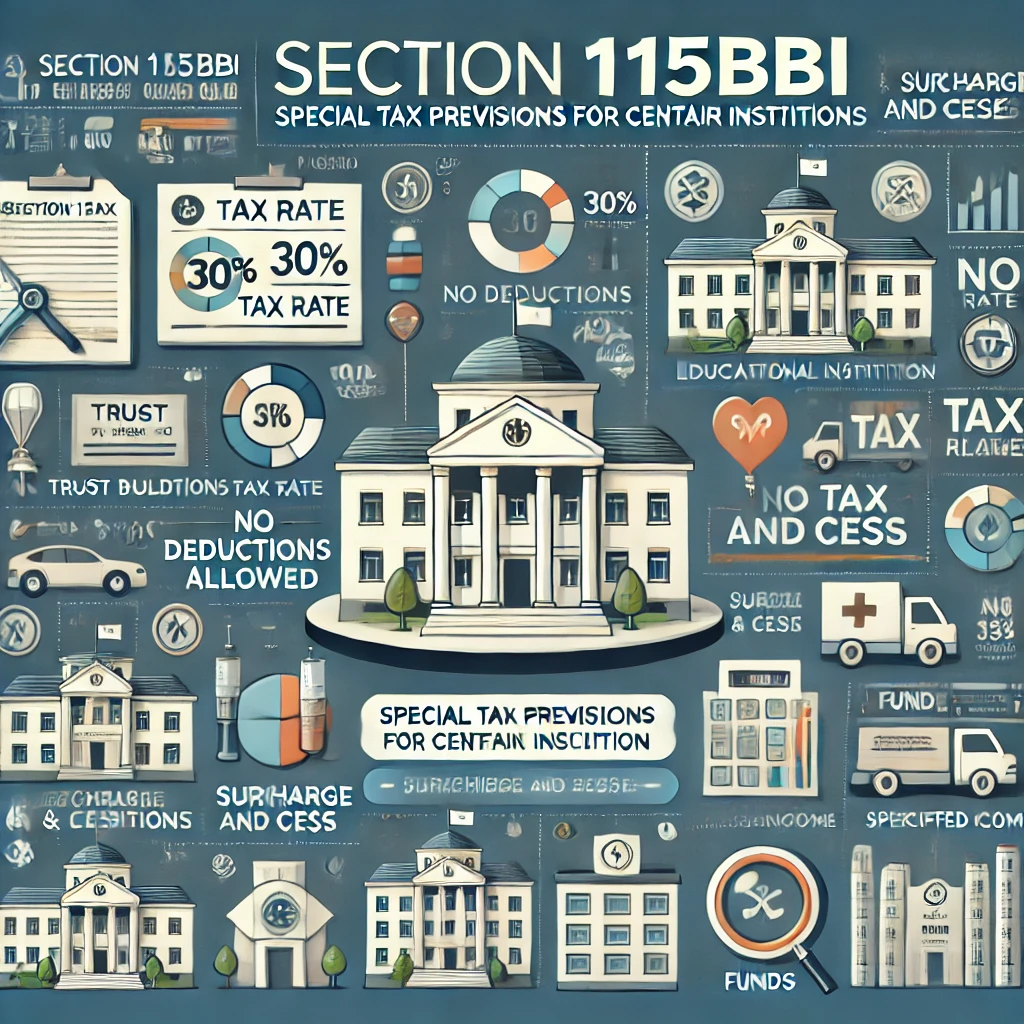The Income Tax Act, 1961, has several provisions aimed at ensuring the transparency and proper management of income for various institutions. One such provision is Section 115BBI, which was introduced through the Finance Act, 2022, and became effective from April 1, 2023. This section imposes special tax rules on certain funds, trusts, educational institutions, and hospitals.
In this comprehensive guide, we will explore the key aspects of Section 115BBI, including its scope, tax rates, applicability, and special provisions.
What is Section 115BBI of the Income Tax Act?
Section 115BBI deals with the specified incomes of certain funds, trusts, and institutions that fall under sections 10(23C) and 11 of the Income Tax Act. The primary purpose of this section is to ensure that these institutions are taxed at a special rate when certain specified incomes are accumulated beyond permitted limits or when they fail to meet exemption criteria.

Scope and Applicability of Section 115BBI
This section applies to the following types of assessees:
- Funds or institutions referred to under Section 10(23C)(iv).
- Trusts or institutions referred to under Section 10(23C)(v).
- Universities or educational institutions referred to under Section 10(23C)(vi).
- Hospitals or medical institutions referred to under Section 10(23C)(via).
- Trusts or institutions that are covered under Section 11.
These entities are generally exempt from tax under normal circumstances. However, if they accumulate income beyond certain limits or fail to comply with the conditions of the Income Tax Act, Section 115BBI steps in to tax the specified income at a special rate.
What is Specified Income?
The term “specified income” under Section 115BBI refers to particular types of income that are subject to taxation. It includes the following:
- Accumulated income exceeding 15% of the total income when such accumulation is not permitted under any specific provisions.
- Deemed income as per:
- Explanation 4 to Section 10(23C) (Third Proviso).
- Section 11(1B) or Section 11(3).
- Income not exempt under Section 10(23C) due to violations of specific conditions mentioned in Clause (b) of the Third Proviso of the section.
- Income deemed to be taxable under the 21st Proviso of Section 10(23C) or Section 13(1)(c) or Section 13(1)(d), which governs trust activities and fund management.
- Any income not excluded from the total income as per Section 11(1)(c).
Taxation under Section 115BBI: Special Rate for Specified Income
Section 115BBI specifies that the tax rate applicable to the specified income of the institutions is a flat rate of 30%. This special rate overrides all other provisions of the Income Tax Act.
How is the Tax Calculated?
The total tax payable under Section 115BBI consists of two components:
- Tax on specified income: The specified income is taxed at 30%.
- Tax on the balance income: Any income other than the specified income is taxed as per the regular rates applicable to that particular institution or trust.
For instance, if a university accumulates income beyond the permitted 15% limit, the excess amount will be treated as specified income and taxed at 30%, irrespective of other provisions of the Income Tax Act.
No Deductions Allowed under Section 115BBI
One of the most important provisions of Section 115BBI is that no deduction is allowed for any expenditure, allowance, or set-off of losses when computing the specified income.
This means that an assessee cannot claim any deductions for expenses incurred or losses sustained when calculating the amount of tax on specified income. The goal is to ensure that 100% of the specified income is brought to tax without any adjustments.
Surcharge and Cess on Tax under Section 115BBI
In addition to the basic tax on specified income, the income tax calculated under Section 115BBI is also subject to:
- Surcharge: The rate of surcharge depends on the category of the assessee (e.g., individuals, HUFs, firms, companies, etc.) as per the applicable schedule in the Finance Act.
- Cess: A Health and Education Cess of 4% is levied on the total tax and surcharge.
This further increases the tax liability of the institutions with specified income.
Surcharge and Cess on Tax under Section 115BBI
In addition to the basic tax on specified income, the income tax calculated under Section 115BBI is also subject to:
- Surcharge: The rate of surcharge depends on the category of the assessee (e.g., individuals, HUFs, firms, companies, etc.) as per the applicable schedule in the Finance Act.
- Cess: A Health and Education Cess of 4% is levied on the total tax and surcharge.
This further increases the tax liability of the institutions with specified income.
Key Takeaways of Section 115BBI
- Section 115BBI is applicable from assessment year 2023-24 onwards.
- It applies to funds, trusts, universities, hospitals, and other institutions under Sections 10(23C) and 11.
- Specified income includes accumulated income beyond 15%, deemed income, and income violating exemption conditions.
- The tax rate on specified income is 30%, with no deductions allowed.
- The tax is subject to surcharge and 4% Health and Education Cess.
FAQs about Section 115BBI
Q1. What is the primary purpose of Section 115BBI?
Section 115BBI aims to tax certain specified incomes of funds, trusts, universities, hospitals, and institutions at a special rate of 30%, ensuring compliance with the provisions of the Income Tax Act.
Q2. Can institutions claim deductions on specified income under Section 115BBI?
No, deductions for expenses, allowances, or set-off of losses are not allowed when computing specified income under Section 115BBI.
Q3. What happens if a trust accumulates more than 15% of its income?
Any income accumulated beyond 15% of the total income is considered specified income and will be taxed at 30% under Section 115BBI.
Q4. Are surcharge and cess applicable to the tax calculated under Section 115BBI?
Yes, the tax on specified income is subject to surcharge and a 4% Health and Education Cess.
Conclusion
Section 115BBI introduces stringent tax provisions for specific incomes of certain institutions, ensuring transparency and proper fund management. By imposing a 30% tax on specified income and disallowing any deductions, the Income Tax Act ensures that these institutions adhere to the tax regulations. Institutions must remain vigilant and ensure compliance to avoid additional tax burdens.
If you are managing a fund, trust, educational institution, or hospital, it’s crucial to understand the implications of Section 115BBI to manage your finances effectively and stay compliant with the law.



